7A Unit 3 语法
牛津英语7A Unit3易错题整理(二)(含答案和解析)
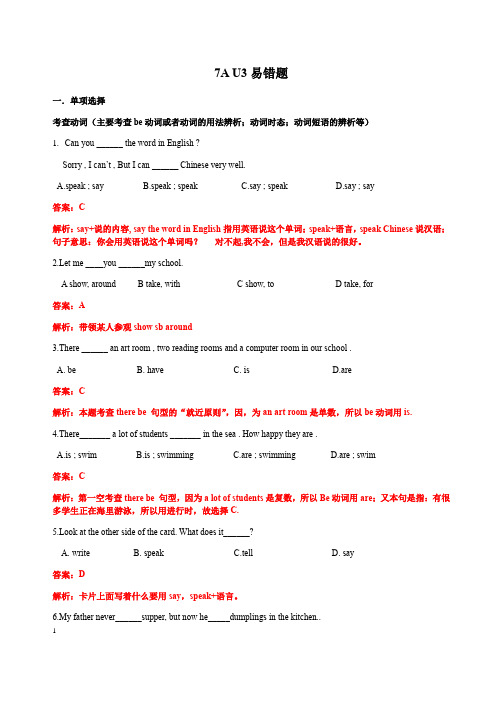
7A U3易错题一.单项选择考查动词(主要考查be动词或者动词的用法辨析;动词时态;动词短语的辨析等)1.--Can you ______ the word in English ?--Sorry , I can’t , But I can ______ Chinese very well.A.speak ; sayB.speak ; speakC.say ; speakD.say ; say答案:C解析:say+说的内容, say the word in English指用英语说这个单词;speak+语言,speak Chinese说汉语;句子意思:你会用英语说这个单词吗?对不起,我不会,但是我汉语说的很好。
2.Let me ____you ______my school.A show, aroundB take, withC show, toD take, for答案:A解析:带领某人参观show sb around3.There ______ an art room , two reading rooms and a computer room in our school .A. beB. haveC. isD.are答案:C解析:本题考查there be 句型的“就近原则”,因,为an art room是单数,所以be动词用is.4.There_______ a lot of students _______ in the sea . How happy they are .A.is ; swimB.is ; swimmingC.are ; swimmingD.are ; swim答案:C解析:第一空考查there be 句型,因为a lot of students是复数,所以Be动词用are;又本句是指:有很多学生正在海里游泳,所以用进行时,故选择C.5.Look at the other side of the card. What does it______?A. writeB. speakC.tellD. say答案:D解析:卡片上面写着什么要用say,speak+语言。
七年级上册英语unit3语法知识点

七年级上册英语unit3语法知识点七年级上册英语Unit 3 语法知识点英语语法对于英语学习者来说是非常重要的,尤其是对于初学者。
在七年级上册的英语课程中,Unit 3 包括了很多重要的语法知识点,本文将为大家详细介绍这些知识点及其用法。
1. 一般现在时一般现在时是英语中最常用的时态,表示当前或经常性的动作,也可以指状态。
其构成为主语 + 动词原形。
例如:“She likes music.” (“她喜欢音乐。
”)2. 现在进行时现在进行时表示正在发生的动作,其构成为主语+ “be” 动词(am/is/are) + 现在分词。
例如:“She is singing now.” (“她正在唱歌。
”)3. 一般过去时一般过去时表示过去某个时间发生过的动作,其构成为主语 + 动词的过去式。
例如:“I watched TV last night.” (“昨晚我看了电视。
”)4. 过去进行时过去进行时表示过去某个时间正在进行的动作,其构成为主语+ “was/were” + 现在分词。
例如:“I was watching TV last night.” (“昨晚我正在看电视。
”)5. 一般将来时一般将来时表示将来要发生的动作,其构成为主语+ “will” + 动词原形。
例如:“I will go to the cinema tomorrow.” (“我明天会去电影院。
”)6. 将来进行时将来进行时表示将来某个时间正在进行的动作,其构成为主语+ “will be” + 现在分词。
例如:“I will be watching TV at 8 PM tomorrow.” (“我明天晚上8点正在看电视。
”)7. 现在完成时现在完成时表示过去已经完成了的动作,并且与现在有关,其构成为主语+ “have/has” + 过去分词。
例如:“I have finished my homework.” (“我已经完成了我的家庭作业。
七年级英语上册Unit3 语法
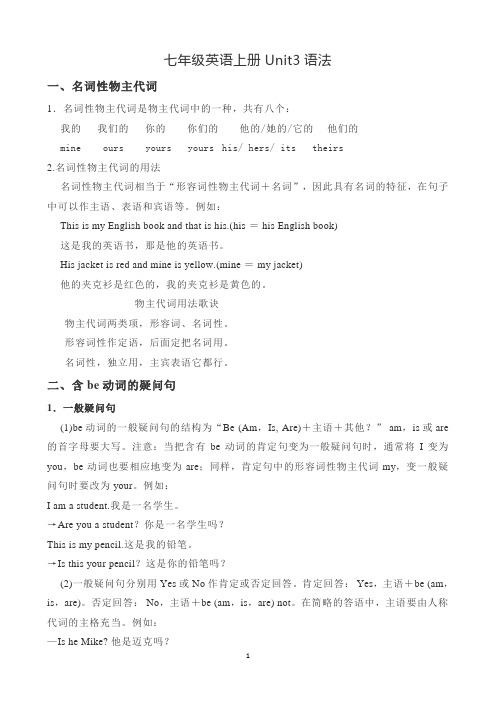
七年级英语上册Unit3语法一、名词性物主代词1.名词性物主代词是物主代词中的一种,共有八个:我的我们的你的你们的他的/她的/它的他们的mine ours yours yours his/ hers/ its theirs2.名词性物主代词的用法名词性物主代词相当于“形容词性物主代词+名词”,因此具有名词的特征,在句子中可以作主语、表语和宾语等。
例如:This is my English book and that is his.(his = his English book)这是我的英语书,那是他的英语书。
His jacket is red and mine is yellow.(mine = my jacket)他的夹克衫是红色的,我的夹克衫是黄色的。
物主代词用法歌诀物主代词两类项,形容词、名词性。
形容词性作定语,后面定把名词用。
名词性,独立用,主宾表语它都行。
二、含be动词的疑问句1.一般疑问句(1)be动词的一般疑问句的结构为“Be (Am,Is, Are)+主语+其他?” am,is或are 的首字母要大写。
注意:当把含有be动词的肯定句变为一般疑问句时,通常将I变为you,be动词也要相应地变为are;同样,肯定句中的形容词性物主代词my,变一般疑问句时要改为your。
例如:I am a student.我是一名学生。
→Are you a student?你是一名学生吗?This is my pencil.这是我的铅笔。
→Is this your pencil?这是你的铅笔吗?(2)一般疑问句分别用Yes或No作肯定或否定回答。
肯定回答: Yes,主语+be (am,is,are)。
否定回答: No,主语+be (am,is,are) not。
在简略的答语中,主语要由人称代词的主格充当。
例如:—Is he Mike? 他是迈克吗?—Yes,he is./No,he isn’t.是的,他是。
Unit3知识点整理牛津译林版七年级英语上册
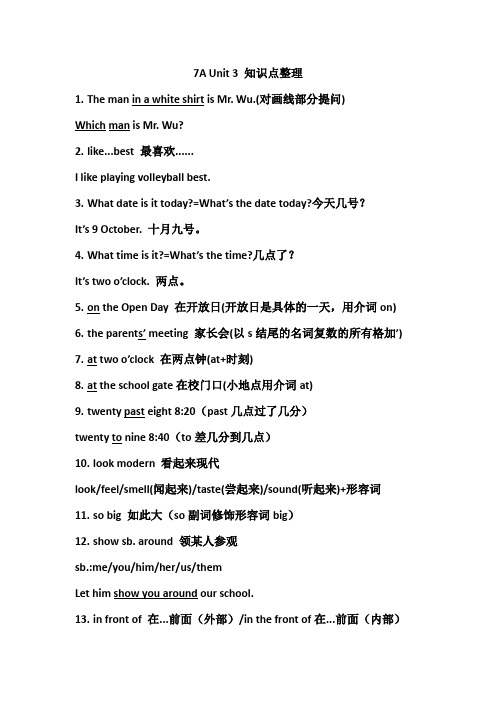
7A Unit 3 知识点整理1.The man in a white shirt is Mr. Wu.(对画线部分提问)Which man is Mr. Wu?2.like...best 最喜欢......I like playing volleyball best.3.What date is it today?=What’s the date today?今天几号?It’s 9 October. 十月九号。
4.What time is it?=What’s the time?几点了?It’s two o’clock. 两点。
5.on the Open Day 在开放日(开放日是具体的一天,用介词on)6.the parents’ meeting 家长会(以s结尾的名词复数的所有格加’)7.at two o’clock 在两点钟(at+时刻)8.at the school gate在校门口(小地点用介词at)9.twenty past eight 8:20(past几点过了几分)twenty to nine 8:40(to差几分到几点)10.look modern 看起来现代look/feel/smell(闻起来)/taste(尝起来)/sound(听起来)+形容词11.so big 如此大(so副词修饰形容词big)12.show sb. around 领某人参观sb.:me/you/him/her/us/themLet him show you around our school.13.in front of 在...前面(外部)/in the front of在...前面(内部)Miss Li is standing in the front of our classroom and writing some new words on the blackboard.There is a tree in front of our house.14.on the ground/first/second/third floor在一楼/二楼/三楼/四楼The cinema is on the third floor.15.two classroom buildings两栋教学楼名词修饰名词时一般第一个名词用单数,但也有一些特例:clothes shops/sports shops/women teachers/men doctors16.have meetings/have a meeting 开会I want to know when to have the meeting.17.the man in a white shirt/the man in white穿着白衬衫的男的/穿着白衣服的男的in介词+颜色/衣服:穿着......(状态) The man in white is my brother.wear动词+衣服:穿着......(状态) I wear a red coat today.put on动词短语+衣服:穿上......(动作)It’s cold outside. Please put on your coat.18.the man with glasses 戴眼镜的那个男的(with介词:戴着)Who is the man with glasses?(句中有谓语,用介词with)Daniel wears glasses.(句中无谓语,用动词wear作谓语)19.look(v.) at=have a look(n.) at 看一看......Let me look at the picture.=Let me have a look at the picture.20.the pictures of my friends 我朋友们的照片21.on the wall 在墙上There is a picture on the wall.(墙上挂的或贴的东西用on)There is a hole in the wall.(墙内部的用in)22.Let me see. 让我想想。
Unit3重点语法牛津译林版英语七年级上册

常州市2023年7AU3 牛津译林版重点语法强调一.重点词组家长会the parents’meeting今天是10月9日。
Today is the ninth of October.我们的开放日our open day现在几点?What time is it now?你最喜欢哪门学科?Which subject do you like best?下午两点开始begin at two o'clock in the afternoon观摩我们其中的两堂课watch two of our lessons在校门口碰面meet at the school gate在开放日on the open day穿着一件白衬衫的男子a man in a white shirt在教学楼前面in front of the teaching building看起来现代look modern看起来年轻look young看起来漂亮look beautiful在底层on the ground floor既干净又漂亮be clean and bright有一间美术室have an art room那儿的建筑the building over there请往这边走Please this way在学校礼堂开会have a meeting at the school hall在教学楼后面behind the teaching building带你参观我的学学校show you around my school二.单选题1.你的姐姐有一个足球吗?很抱歉。
我不认为他有一个足球。
Does your sister have a football?Sorry, I don't think she has one .动词有have,变成一般疑问句,要用助动词do或者does主语是your sister,助动词用does代词one同类不同物,it同类同物2.他将要跟我们说些什么?他的学校生活。
牛津版英语七年级上—U1-U3强化—语法综合—语音—阅读

☆词汇复习Unit 1I. 重点词汇序号英文词性词义拓展1 v. 邀请n. 邀请,邀请函邀请某人去做某事2 adj.昂贵的n. 费用,花费adj. 便宜的3 n.代理人n. 代理处在旅行社4 adv.不久迟早提问多久用,用将来时, 回答通常用i5 v.提升,举起举起辨析raise与rise6 n.国家n. 国家adj. 国际的n. 国籍7 adj.古老的古时候,在古代8 n.历史adj. 历史的,史实的adj. 历史上著名的,有历史性的辨析:historichistorical9 n.吸引力,趣味v. 使…感兴趣adj. 感兴趣的对…感兴趣的adj. 有趣的10 adj.精彩的令人高兴n.(U) 惊奇,惊异;1. 7A U1~U3复习II. 根据音标写出下列单词及解释________/'brəuʃə/n. ___________________/swɔn/n. ___________________/brik/n. ___________________/stəun/n. ___________________/'mauntən/n. ___________________/'hɔlədi/n. ___________III. 汉译英1.妈妈打算在11月底带我去北京。
My mother _______ ________ _______ take me to Beijing at the end of November.2. 我们计划了一次去北京的旅行。
We _______ a trip to Beijing.3.我的父母正在旅行社和旅行代理人谈话。
My parents _______ ________ ______ the travel agent at the travel agent’s/agency.4.北京有很多名胜古迹,例如,长城、颐和园、天安门广场和故宫博物院等。
人教版七年级上册英语Unit3语法总结
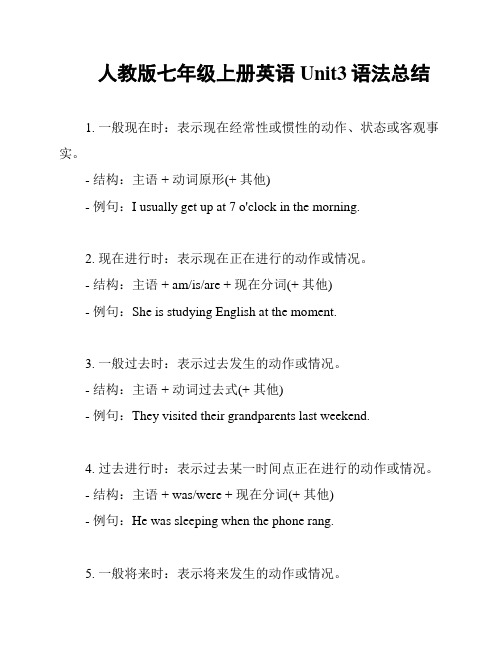
人教版七年级上册英语Unit3语法总结1. 一般现在时:表示现在经常性或惯性的动作、状态或客观事实。
- 结构:主语 + 动词原形(+ 其他)- 例句:I usually get up at 7 o'clock in the morning.2. 现在进行时:表示现在正在进行的动作或情况。
- 结构:主语 + am/is/are + 现在分词(+ 其他)- 例句:She is studying English at the moment.3. 一般过去时:表示过去发生的动作或情况。
- 结构:主语 + 动词过去式(+ 其他)- 例句:They visited their grandparents last weekend.4. 过去进行时:表示过去某一时间点正在进行的动作或情况。
- 结构:主语 + was/were + 现在分词(+ 其他)- 例句:He was sleeping when the phone rang.5. 一般将来时:表示将来发生的动作或情况。
- 结构:主语 + will + 动词原形(+ 其他)- 例句:I will go to the park tomorrow.6. 能力和意愿:can,could,may,might,must,shall,should,would等。
- 例句:You should finish your homework before going out.7. 祈使句:表示命令、请求、建议、劝告或禁止等。
- 结构:动词原形(+ 其他)- 例句:Please pass me the book.8. 直接引语和间接引语:表示他人的陈述、断言或问句等。
- 结构:直接引语:引号内的内容;间接引语:引号外的内容。
- 例句:- 直接引语:He said, "I am studying English."- 间接引语:He said that he was studying English.以上是人教版七年级上册英语Unit3语法总结,供参考。
译林版英语七年级上册unit3知识点
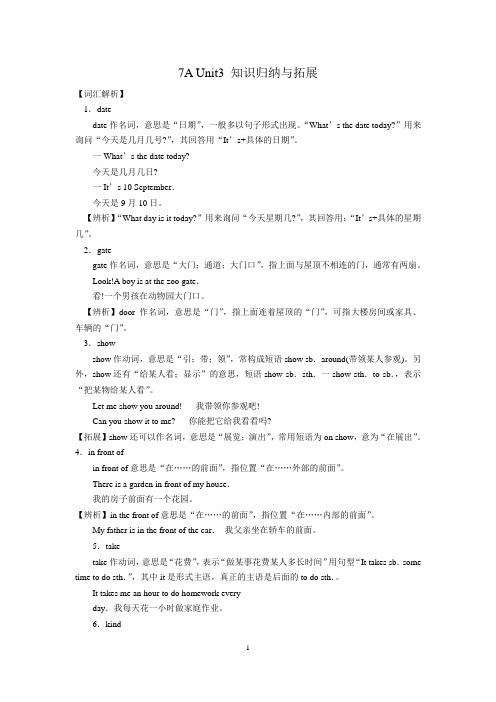
7A Unit3 知识归纳与拓展【词汇解析】1.datedate作名词,意思是“日期”,一般多以句子形式出现。
“What’s the date today?”用来询问“今天是几月几号?”,其回答用“It’s+具体的日期”。
一What’s the date today?今天是几月几日?一It’s 10 September.今天是9月10日。
【辨析】“What day is it today?”用来询问“今天星期几?”,其回答用:“It’s+具体的星期几”。
2.gategate作名词,意思是“大门;通道;大门口”,指上面与屋顶不相连的门,通常有两扇。
Look!A boy is at the zoo gate.看!一个男孩在动物园大门口。
【辨析】door作名词,意思是“门”,指上面连着屋顶的“门”,可指大楼房间或家具、车辆的“门”。
3.showshow作动词,意思是“引;带;领”,常构成短语show sb.around(带领某人参观)。
另外,show还有“给某人看;显示”的意思,短语show sb.sth.一show sth.to sb.,表示“把某物给某人看”。
Let me show you around! 我带领你参观吧!Can you show it to me? 你能把它给我看看吗?【拓展】show还可以作名词,意思是“展览;演出”,常用短语为on show,意为“在展出”。
4.in front ofin front of意思是“在……的前面”,指位置“在……外部的前面”。
There is a garden in front of my house.我的房子前面有一个花园。
【辨析】in the front of意思是“在……的前面”,指位置“在……内部的前面”。
My father is in the front of the car.我父亲坐在轿车的前面。
5.taketake作动词,意思是“花费”,表示“做某事花费某人多长时间”用句型“It takes sb.some time to do sth.”,其中it是形式主语,真正的主语是后面的to do sth.。
Unit3+知识点梳理 牛津译林版英语七年级上册
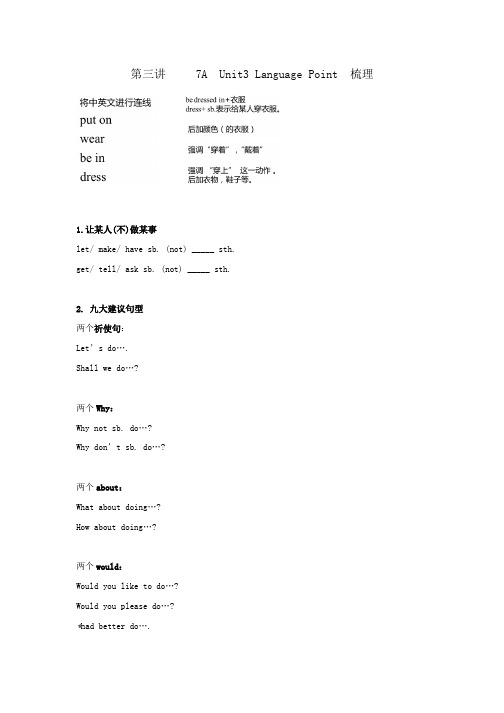
第三讲 7A Unit3 Language Point 梳理1.让某人(不)做某事let/ make/ have sb. (not) _____ sth.get/ tell/ ask sb. (not) _____ sth.2. 九大建议句型两个祈使句:Let’s do….Shall we do…?两个Why:Why not sb. do…?Why don’t sb. do…?两个about:What about doing…?How about doing…?两个would:Would you like to do…?Would you please do…?⭐had better do….3.walk to spl. 步行去某地= go to spl. on foot类似用法:骑车去某地ride to spl.= go to spl. by bike ( on one’s bike)开车去某地drive to spl. =go to spl. by car (in one’s car)坐公交/地铁去某地take the bus/underground to spl.= go to spl. by bus/ underground (on the bus/underground) ①和某人一起散步walk with sb.带某人去散步take sb. for a walk②遛狗walk one's dog = take the dog for a walk③去散步go for a walk= take a walk= go walking④five minutes’ walk(易错)=()--- How far is it from here to you school?--- It’s about twenty __________ (minute) walk.4.I walk to my bowl many times a day. (Comic)我一天走向我的碗好几次。
七年级英语上册Unit3Welcometoourschool知识点梳理下新版牛津版

7AUnit 3知识点梳理(下)复习导入重点单词、短语the parents’ meeting look beautifulat the school gatein front ofon the ground floor an art roomon the wallsay hello to…from… to …a long wayall kinds ofreading roomfar away fromborrow … from …on the phoneon footwalk to schooltake a bus /by bus after schoolthis wayall the besta few 家长会开起来漂亮在校门口在…前面在一楼,在底层一间美术室在墙上向…问好从…到…一段很长的路程各种各样的阅览室离…很远从…借…通电话步行步行去学校乘公共汽车下课后这边请一切顺利,往事如意一些,几个用法:show sb. aroundtell sb. about sth.play with sb.thanks for (doing) sth.It takes sb. some time to do sth. there is/are +n. +地点带领某人参观告诉某人关于某事和某人玩因(做)某事而感谢(某人)某人花…时间做某事某地有某物/某人What’s the date/day/time? = what date/day/time isit?询问日期/星期/时间。
知识点梳理一.词汇&短语:WORDS&PHRASES1. Mum, look at the pictures of my friends on the walls.妈妈,看一看墙上我朋友的照片。
On the wall 意为“在墙上”。
Wall 可数名词,意为“墙”。
辨析: in the wall 与 on the wallon the wall 在墙上用来指在墙的表面上There is a picture on the wall.墙上有一幅画。
七年级上册英语第三单元知识点总结
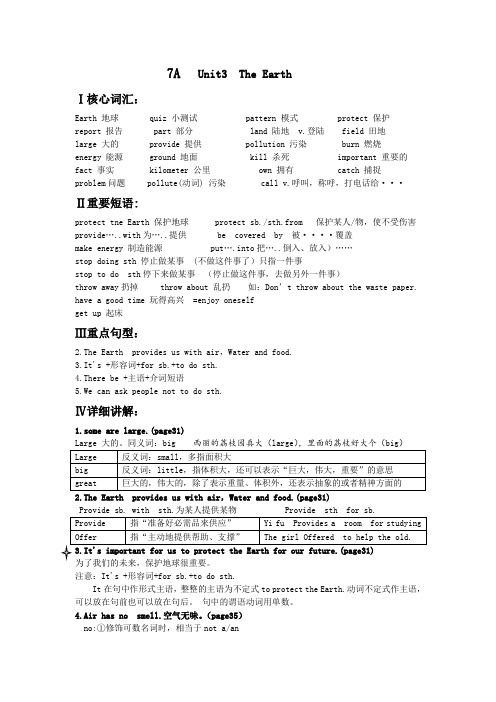
7A Unit3 The EarthⅠ核心词汇:Earth 地球 quiz 小测试 pattern 模式 protect 保护report 报告 part 部分 land 陆地 v.登陆 field 田地large 大的 provide 提供 pollution 污染 burn 燃烧energy 能源 ground 地面 kill 杀死 important 重要的fact 事实 kilometer 公里 own 拥有 catch 捕捉problem问题 pollute(动词) 污染 call v.呼叫,称呼,打电话给···Ⅱ重要短语:protect tne Earth 保护地球 protect sb./sth.from 保护某人/物,使不受伤害provide…..with为…..提供 be covered by 被····覆盖make energy 制造能源put….into把…..倒入、放入)……stop doing sth 停止做某事 (不做这件事了)只指一件事stop to do sth停下来做某事(停止做这件事,去做另外一件事)throw away扔掉 throw about 乱扔如:Don’t throw about the waste paper. have a good time 玩得高兴 =enjoy oneselfget up 起床Ⅲ重点句型:2.The Earth provides us with air,Water and food.3.It's +形容词+for sb.+to do sth.4.There be +主语+介词短语5.We can ask people not to do sth.Ⅳ详细讲解:1.some are large.(page31)2.The Earth provides us with air,Water and food.(page31)3.It's important for us to protect the Earth for our future.(page31)为了我们的未来,保护地球很重要。
新译林版英语七年级上册第三单元语法7Aunit3

Presentation
I am a teacher. My students like _m__e.
You are students. I teach _y_o_u English.
She is a girl. We call _h_e_r_ Lucy.
He is a boy. All the boys like _h_i_m_ because he is good at football.
___W__e,__y_o_u_a_n_d_t_h_e_y_a_r_e_f_r_o_m__C_h_i_n_a_.
4、在简短对话中,当人称代词单独使用或在not 后多用宾格.
— I like English. — _____ too.
A. I B. He C. Me
一.人称代词
5、it 的特殊用法
① it 可指不知性别的婴儿或不确指性别的人.
Unit 3 Grammar
Presentation
_I_ am Kitty. This is Amy. _S_h_eis my classmate. W__e_ are good friends. W__e_ like playing volleyball. _It_ is very interesting. Peter and Simon are my classmates, too.T_h__ey_ like playing football very much.What do _y_o_u_ like?
二、用法举例:
1. My name is Millie. I live in Beijing. ( I代自己, Millie )
2. Are you in Class1, Grade7, Andy? ( you代对方,指Andy )
新译林7A英语全册知识点归纳总结

新译林7A英语全册知识点归纳总结Unit one一、词汇知识点整理:look after \ take care of 照顾on the first day 在第一天Class 1,Grade 7 7年级1班play football 踢足球after school 放学后be\come from 来自be good at \do well in 擅长fly kites 放风筝go home 回家listen to music 听音乐play a game 玩游戏wear glasses 戴眼镜at school 在学校all the lessons 所有的课程talk about 谈论over there 那里a lot of hobbies 许多爱好二、结构用法:love\like doing sth 喜欢做某事let’s +动词原形让我们I am\My name is 我叫welcome to +地点欢迎来到This is 这是be good at \do well in doing 擅长做in Class…Grade…在几年级几班live with…in…和谁住在哪里I’m …year old. 我几岁了。
I have…hair.我留着……头发三、句式用法What’s your name?你叫什么名字?Nice to meet you! 很高兴见到你。
I love reading. 我喜欢阅读Now let’s meet our new classmates. 现在让我们认识下我们的新同学。
I often play football after school.放学后我经常踢足球。
She is tall and slim. 她个头很高,身材苗条。
He is from Nanjing. 他来自南京。
He is good at Maths. 他擅长于数学。
Millie is 11 years old.米莉11岁。
7A Unit 3 Grammar

练习: (1) He (2) He (3) She (4) She (5) You (6) They (7) I
1. wall (n.) 墙,可数名词 Look! His photo is on the wall.看! 他的照片在墙上。 on the wall 指某物悬挂在墙 的表面,如照片、图画等挂 在墙上 in the wall 指某物嵌在墙内, 如墙上的门、窗等
练习:P36 (1) it (2) him (3) them (4) me (5) her (6) it
3. phone(n.&vt.):电话;打电话=telephone
例: (1)你这里有电话吗? Do you have a phone here? (phone作名词) (2)我经常给父母打电话。 I often phone my parents.(phone作动词) 【固定搭配】 (1) on the phone 在通话中,在电话里 (2) answer a phone 接电话 (3) public phone 公共电话 (4) phone box 电话亭
There is a picture on the wall of the classroom and there is a window in the wall, too. 教室的墙上有一幅画,墙上也有一扇窗。
2. Let me see. (1) 让我看一看 = Let me have a look. (2) 让我想一想 词组:让某人做某事 Let sb do sth.(Let sb+V原)
7. help (vt.)帮助 帮助某人做某事(2种表达方式) help sb with sth help sb (to) do sth(to可以省略) 如:(1)帮助我做作业 help me with my homework=help me (to) do my homework (2)帮助她学英语 help her with English= help he learn English
牛津上海版7AUnit 3知识点及语法点

U3一、必会词汇1. foreigner n. 外国人【词性转换】foreign ['fɔrin] adj. 外国的e.g. Nowadays, more and more foreigners come to stay and work in Shanghai.如今,越来越多的外国人来上海居住、工作。
2. crowded adj. 拥挤的【词性转换】crowd n. 人群【记忆】be crowded with 挤满了……e.g. Shanghai is a crowded city. Nanjing Road and Huaihai Road are always crowded with people.上海是一个拥挤的城市。
南京路和淮海路总是挤满了人。
3. example n. 例子e.g. Please give me an example. 给我举个例子。
【记忆】for example 例如【提示】for example作“例如”讲时,一般只以同类事物或人中的“一个”为例,作插入语,用逗号隔开,可置于句首、句中或句末。
e.g. For example, air has no colour. 例如,空气是无色透明的。
批注:很对孩子弄不清楚for example和such as 的区别,可以给孩子举恰当的例子,方便孩子理解。
4. Canada n. 加拿大【词性转换】Canadian n. & adj. 加拿大人;加拿大(人)的(它可数否?答:可数)(它的复数怎么变?答:直接加s)e.g. I am Canadian. 我是加拿大人。
(这里的Canadian是形容词,相当于I am from Canada. 我来自加拿大)e.g. I am a Canadian. 我是一个加拿大人。
(这里的Canadian是名词,表示“加拿大人”,因此前面加上不定冠词a)【注意】Canadian的复数形式是Canadians批注:细心的老师会发现,这课的重点是不同国家名称及某国人的形式,个人觉得在教学课程中,要帮助孩子总结规律,这是个人在教学中总结的规律,有不全面的地方,“中国日本单复同,英国法国man变men,其他全部加s”5. Australia n. 澳大利亚【词性转换】Australian n. & adj. 澳大利亚人;澳大利亚(人)的6. India n. 印度【词性转换】Indian n. & adj. 印度人;印度(人)的7. Britain n. 英国【词性转换】British n. & adj. 英国人;英国(人)的e.g. He speaks British English. 他说英国英语。
Unit3易错语法牛津译林版英语七年级上册

常州市2023年牛津译林版7AU3 易错语法强调一.句子翻译常考内容1.请你有空的时候带我参观你的家乡好吗?Would you please show me around your hometown when you are free?动词用法请某人做某事好吗?Would you please do something词组带某人参观某地show somebody around someplace有空的时候be free2.谢谢你写信告诉我有关你学校的情况.Thanks for telling me about your school.感谢某人做某事动词用法Thanks for doing something或者thank somebody for doing something动词用法告诉某人某物tell somebody something或者是tell somebody about something3.你的儿子在哪哪所学校读书?Which school does your son study at?注意介词at不要漏掉在学校学习study at school4.下课后,学生们经常在操场上玩耍。
The students often play on the playground after school.词组在操场上on the playground放学后after school 课后after class5.老师们对每一个学生都很友好.The teachers are all kind to each other.词组对某人友好be kind to somebody /be friendly to somebody二,单选易错知识点1.我的教室在一楼,这边请。
My classroom is on the ground floor ,this way please.在几楼on the…floor词组固定搭配这边请this way2.看这个墙上有很多图片在上面。
牛津7A_unit1-unit8_单元知识点总结

7A 单元总结7A Unit1、2 一、词组或短语二、重点句子1. What’s your name?My name’s…/ I’m…2。
I love reading./ I l ove playing football after school./She loves dancing。
4.She works hard. 她学习/工作很努力。
5。
I like listening to music。
6。
She is good at swimming. = She does well in swimming。
她擅长于游泳. 7。
She wears glasses.8。
He enjoys playing computer games。
9.10。
I take my dog for a walk every day。
我每天带有的狗去散步。
11。
I usually go runningfor half an hourin the morning。
12. 。
他为黄河足球队效力(踢球)。
13。
He is good at scoring goals。
他擅长于射门得分.14. He wants to play in the next World Cup。
15. 。
你在课内说英语说得越多,你将学得越快。
16. ?你对你的新朋友有多了解?17。
,you say, “I’m sorry,I don’t know。
”18。
Can I borrow your pen?四、语法学习带有be动词和do动词的一般现在时.一般现在时:阐述一般的客观事实;目前存在的事实;经常的习惯性的动作。
(1)当主语是第三人称单数时:肯定句:主语+is+其他/主语+动词的等三人称单数形式+其他.如:He is kind.Nancy lives in Nanjing.否定句:主语+isn't+其他/主语+doesn't+动词原形+其他如:He isn’t a student.Nancy doesn’t live in Nanjing.疑问句:Is+主语+其他/Does+主语+动词原形+其他如:Is she your mother?Does Nancy live in Najing?(2)当主语不是第三人称单数时:肯定句:主语+am/are/动词原形+其他如:I am a boy。
译林牛津英语7A期末复习归纳Unit1-8

7A Unit1 This is me 重点词组、句型和知识点归纳1、介绍自己:I am Amy. / My name is Simon.2、介绍别人:This is….3、询问别人的名字What’s your name? 回答:I’m….. / My name is….May I know your name? Yes, I’m…Are you Mr Green? Yes I am. / Sorry. I’m Mr Brown.4很高兴做某事I’m nice / glad _________you. 很高兴见到你。
5Let me see / Let’s go now.Let ______________. 让他进来吧。
6、她长着长发。
She _____ _____ _____. = _______ ______ ______ long.7、提问外貌: What is he like? / What ______ he ______ _______?8、谈论国籍: Where _______ you from? / Where ______ you come from?I am from / come from China. = I am ____________.He is from _______ . = He ______ from ______. = He is ____________. (他是英国人)She ________________. = She __________________. (她来自美国。
)9、谈论出生地– be born-----Where ______ you born? I ____________ in Nanjing.10、谈论爱好:(1) like / love / enjoy doing sth(2) My hobby is playing football.She is good at swimming. = She does well in dancing. = She ______ ______.= She is a _____ _______.注意do well in 的否定句例如:他不擅长跳舞。
江苏牛津译林七年级上册Unit 3基础知识

知识点精析
一、重点词汇
1.(1)begin/start + sth. / doing / to do
家长会在下午两点开始。
The parents’ meeting begins at two o’’clock in the afternoon
看看这些花,他们很漂亮。
Look at these flowers. They are very beautiful.
那只熊猫很可爱。人人都喜欢它。
That panda is cute. Everyone likes it.
Helen是我表妹。我常和她一起玩。
Helen is my cousin. I often play with her.
辨析:there be与have/has的用法区别:
there be表示客观存在
have/has表示所属或拥有
4. on the ground floor在底楼/在一楼
ground floor为英式英语,表示底层,一楼,而美式英语中的一楼为first floor.
我们的教学楼有6层,我们的教室在二楼。
我的妹妹生病了,我需要照顾她。
My sister is ill. I need to look after her.
练习
一.根据句意及汉语提示完成句子
1.The ________(礼堂) on the ground floor looks very clean.
2.We're happy to study in the ________(现代的) classroom.
江苏牛津译林七年级上册Unit 3基础知识
- 1、下载文档前请自行甄别文档内容的完整性,平台不提供额外的编辑、内容补充、找答案等附加服务。
- 2、"仅部分预览"的文档,不可在线预览部分如存在完整性等问题,可反馈申请退款(可完整预览的文档不适用该条件!)。
- 3、如文档侵犯您的权益,请联系客服反馈,我们会尽快为您处理(人工客服工作时间:9:00-18:30)。
辅导教案
学员姓名辅导科目
年级授课教师
课题7A Unit 3 Grammar
授课时间
教学目标
重点、难点
教学内容
7A Unit 3 Grammar
1. by bus 乘公共汽车
by+交通工具表示“乘坐……”
He goes to work by bus every day.
take a taxi 乘坐出租车
take a train 乘坐火车
He often takes No.17 bus to school.
2.open v.打开,开放
Let’s open the window to let in some fresh air.
open adj.开着的
Leave the windows open,so that fresh air can come into the room.
3. all kinds of 各种各样的
what kind of 什么种类
a kind of 一种
different kinds of 不同种类的
There are all kinds of trees in the park.
kind adj.友善的,仁慈的
It’s kind of you to help me.
4.borrow…from 向某人借某物
Can I borrow a book from you?
borrow的反义词是lend,lend表示借出,常用短语lend sth to sb,表示把某物借给某人。
You can’t lend your bike to him.
Can I lend my books to others?
5. Thanks for your letter.
感谢你的来信。
Thanks for或thank you for 后如果跟动词,则要用V-ing形式,for用来说明感谢的原因。
Thank you very much for looking after my dog.
6. a few与few
a few 一般意为“一些,若干”,具有肯定意义,强调“有”;few一般意为“很少”,具有否定意义。
a few 和few都用来修饰可数名词的复数。
He has a few friends,but few good friends.
The text is easy. There are few new words in it.
7. far away from 远离,离……远
away adv.离开,远离
The boy runs away.
表示“离某处有……(多远)时用be …(away)from结构,不能再加far。
The factory is five hundred metres away from our school.
away构成的常见短语:
go away 走开
right away 立刻;马上
put away 把……收拾好
8. It takes me about an hour to get to school.
我大约花费一小时到达学校。
(1)It takes sb some time to do sth 是一个固定句型,意为某人花费多长时间做某事。
其中it用在句子开头作形式主语,真正的主语是后面的动词不定式短语。
It takes me two hours to get there by bike.
(2)spend表示花费时间或金钱,其主语一般是人,常用spend…on sth/(in )doing sth
My brother spent a lot of time on storybooks.
= My brother spent a lot of time in reading storybooks.
(3)cost v.值(多少钱);花费
主语+cost(s)+金钱表示“某物多少钱”
The pen costs 20 yuan.
主语+cost(s)+sb+金钱表示“某物花去某人多少钱”
The ticket costs me more than 100 yuan.
注意:cost的主语是物,不能是人。
(4)pay的主语只能是人,常用pay (sb)(some money)for sth结构,意为付(某人)钱买某物。
She paid ten yuan for the book.
9.人称代词
主格I we you he she it they
宾格me us you him her it them
我我们你,你们他她它他(她,它)们
(1)宾格人称代词置于及物动词和介词后作宾语。
除作宾语外,还可在口语中用作表语。
Would you like to give it to me?
Daniel,open the door,please. It’s me,Simon.
(2)由“动词+副词”构成的动词短语后接名词作宾语时,名词放在副词前后均可。
若代词作宾语时,代词只能放在中间。
Please try on the sports shoes.
=Please try the sports shoes on.
Please try them on.
(3)在某些上下文或语境中,人称代词的选择往往与传统“规定”不一致。
比如在下列语境中,按照传统规则则该用主格的地方却习惯上用宾格。
——Who writes this letter?
——Me.
——Does anyone know where Tom lives?
——Me.
在这类答语中如果用主格,就要带谓语动词。
所以,上面的问句还可以用“I do”来回答。
10. 人称的习惯顺序:
如果有几个不同的人称同时作主语,且用and,or连接时,习惯顺序是单数:you,he,and I(二三一),复数:we,you and they(一二三)。
但是,如果是做错事情,承担责任时,有时说话的人把I(我)放在第一位。
